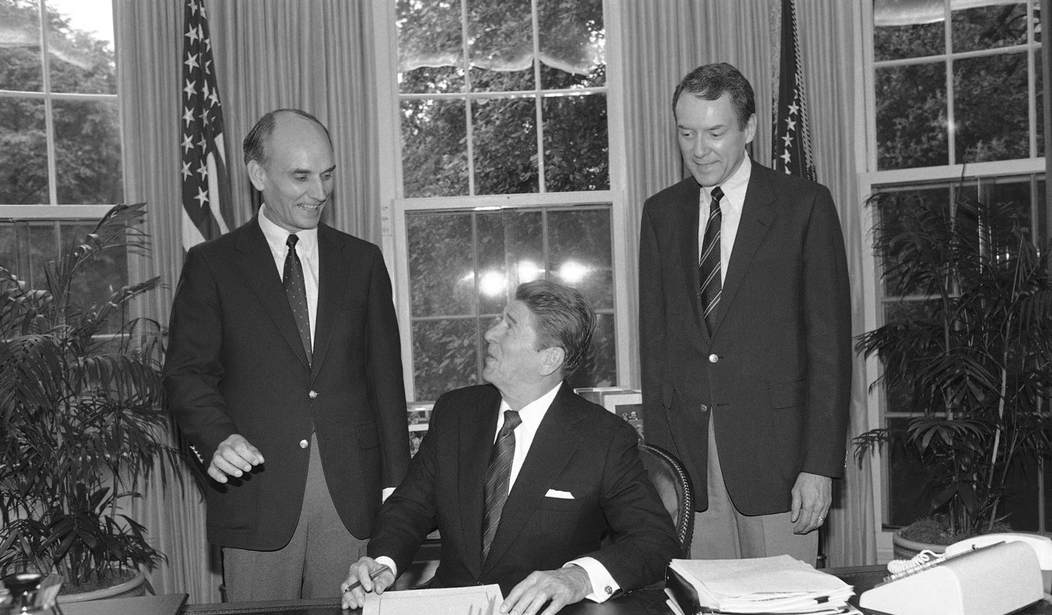Donald Trump is producing the kind of shoot-the-moon economic recovery that we last saw under Ronald Reagan in the 1980s. He's copied a lot from the Reagan playbook: Deregulate; cut taxes; promote American energy. He should also think about adopting another Reaganite initiative: Let American companies grow, merge, restructure and become more profitable so they can compete on the global stage.
In other words, bench the trustbusters.
One of Reagan's first and wisest initiatives was to effectively shut down the antitrust division of the Justice Department. Whereas Jimmy Carter had supported anti-merger activity -- the imbecilic case against AT&T was prosecuted under Carter -- Reagan understood the virtues of allowing companies to exploit the synergies of mergers for greater efficiency and lower costs.
Reagan cut the rate of antitrust enforcement in half. Clinton also had a light touch when it came to approving mergers and acquisitions. Is it an accident that the stock market exploded in these years?
Shareholders usually greatly benefit from mergers. The companies that do the acquiring typically see a rise in their stock prices over time. And shareholders of the companies that are being acquired see even bigger benefits. Given that more than 100 million Americans own stock -- as do all pension funds in America -- it's not clear why this isn't a win-win for everyone.
The counterargument, of course, is that monopolistic hobgoblins will raise prices on consumers. Google, Facebook, Amazon, Apple and so on are said to be taking over the world.
Donald Trump has tended to side with the "big is bad" crowd. Last week the Justice Department announced it might block parts or all of the $62 billion merger between Bayer and Monsanto. Similarly, the DOJ intervention against the $85 billion ATT-Time Warner merger goes to trial soon.
Recommended
Can anyone really believe that there is a danger of monopoly in the entertainment, phone and TV industries? Every American with a camera and a cellphone and a Facebook account is a media player. Cable TV now competes with YouTube, Netflix and hundreds of other entertainment outlets.
As for the Bayer-Monsanto merger, this marriage can leverage knowledge and talent to bring new innovations to market for farmers and consumers both at home and abroad (where we must aggressively compete to sell our agricultural products). The new firm has promised to invest $8 billion in America -- so this could mean more, not fewer, jobs.
Just as the Dow-DuPont merger has allowed America to retain world leadership in chemicals, the Monsanto-Bayer merger would ensure that the U.S. is firmly positioned long-term as the life sciences capital of the world.
If the Justice Department blocks the merger, the big winner could be China, whose state-owned enterprises might swoop into this space. That hardly puts America first.
This isn't 1900, when Standard Oil was thought to be taking over the world and gouging consumers. It's 2018. Global competitiveness, because of trade and technology, has never been more cutthroat. Mergers and hostile takeovers also help eliminate the flab: inefficiencies and sometimes-excessive salaries and benefits of corporate management.
Companies such as Microsoft, IBM and General Motors -- businesses that were once thought by Justice Department officials to be gobbling up the marketplace like Pac-Men -- are facing swarms of domestic and international competitive forces. Today Google and Amazon are on top of the world and seem indomitable. Twelve years from now they could be the next Circuit City or Sears.
It was Barack Obama who promised "to reinvigorate antitrust enforcement," which he said is how "we ensure capitalism works for consumers." As usual, he had it backward. Free-market capitalism always works for consumers. It's government edicts and regulations that are the enemy of consumers and, in too many cases, the friends of our international adversaries.

























Join the conversation as a VIP Member